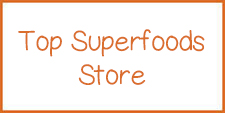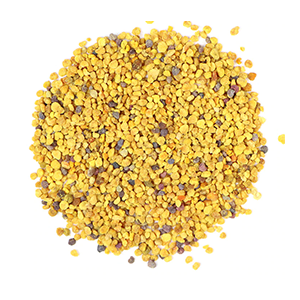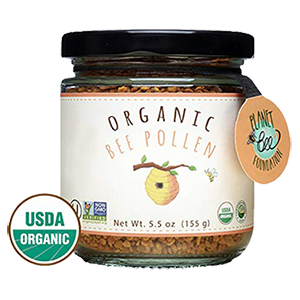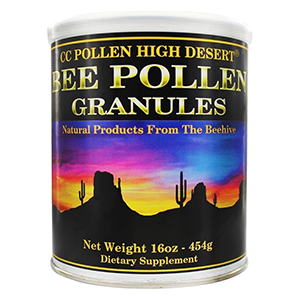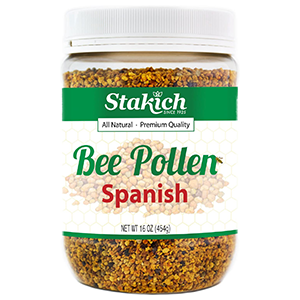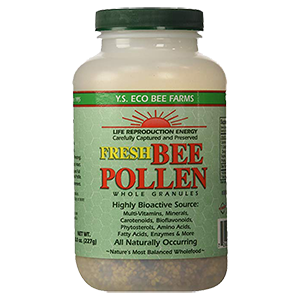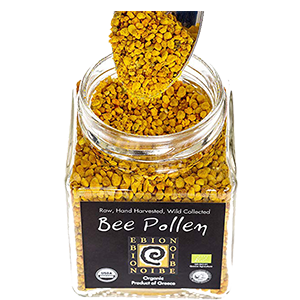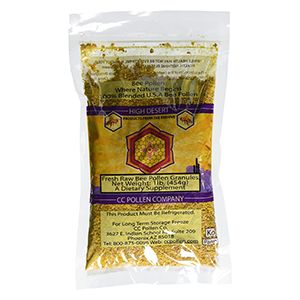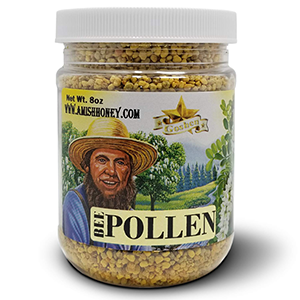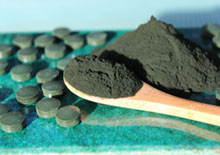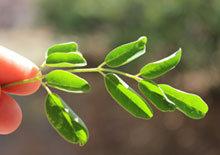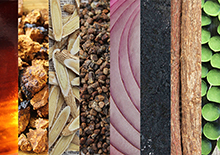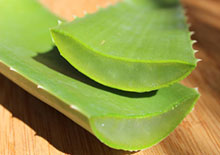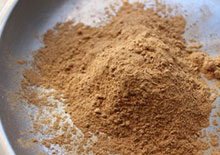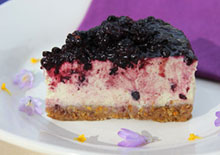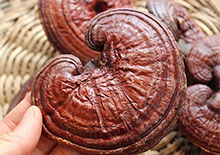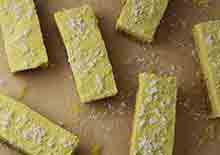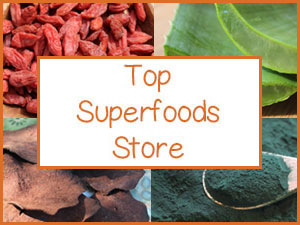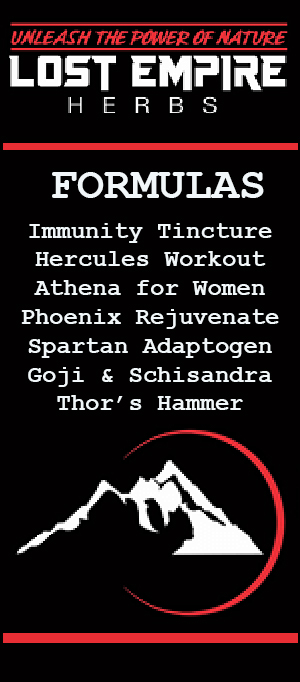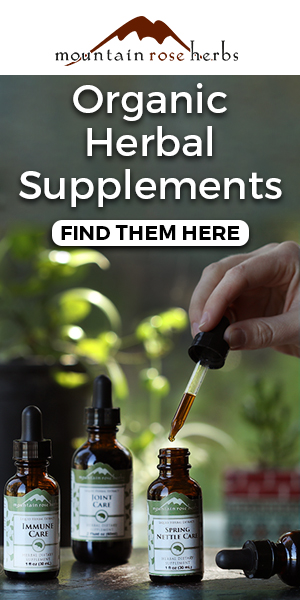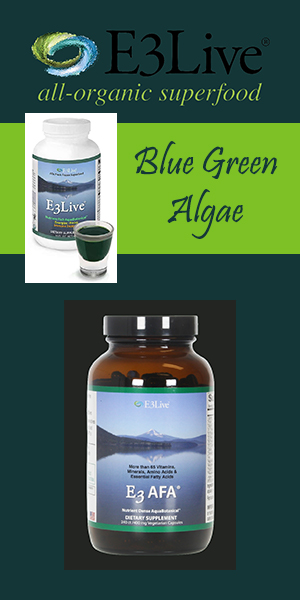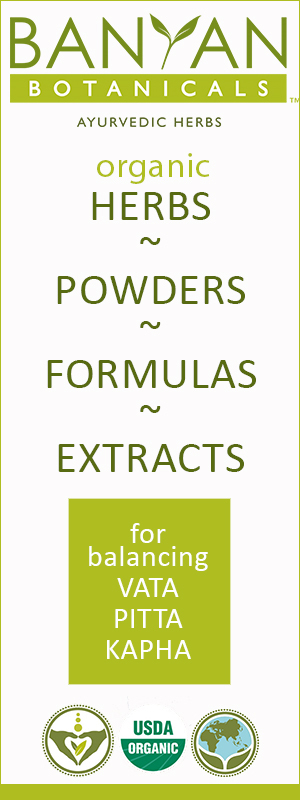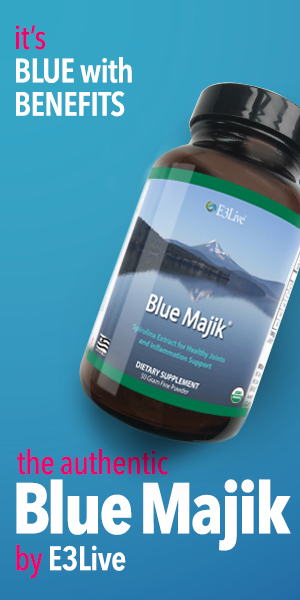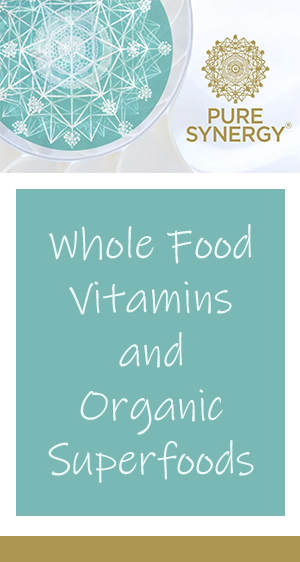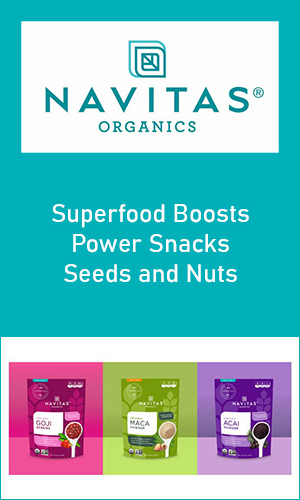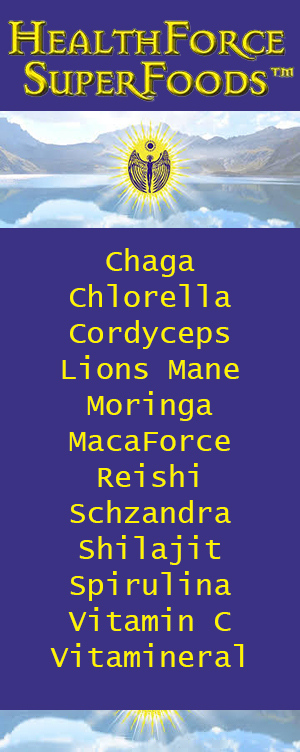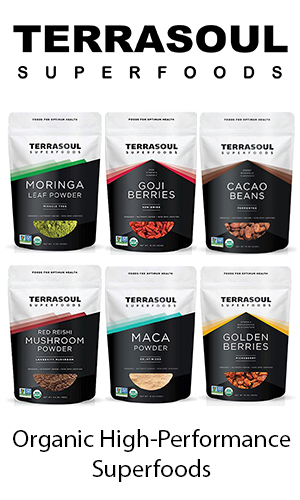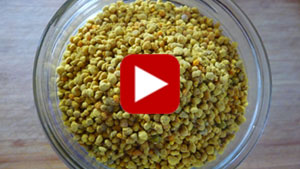- Home
- Top Superfoods
- Bee Pollen Benefits
Bee Pollen Benefits, An Enzyme-Rich Superfood Protein
Intro | What is Bee Pollen? | History | Bee Pollen Benefits | Caution for Newbies | Beekeeping | Bee Pollen Quality | How to Use | Precautions | Shop
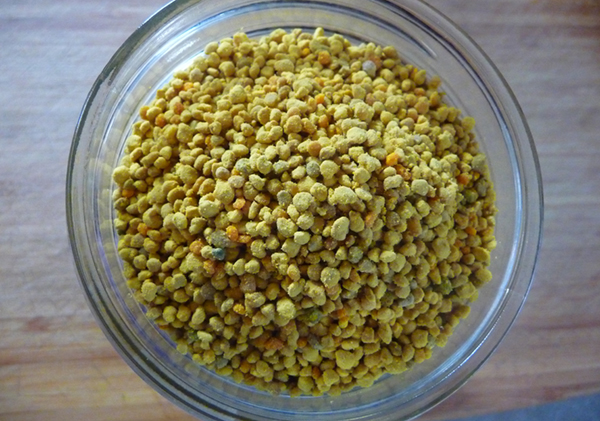
Bee pollen benefits are well known in the world of superfoods and are
up there on our personal top 10 list as an energy-enhancing source of protein.
Bee pollen is considered one of nature's most complete and nourishing foods because of its full spectrum of nutrients, amino acids and enzyme content. The pollen is so concentrated it only takes small amounts to provide one of the best natural multivitamins available.
These golden granules are collected by one of the greatest creatures and master pollinators of the earth, the honeybee!
Table of Contents
Intro | What is Bee Pollen? | History | Bee Pollen Benefits | Caution for Newbies | Beekeeping | Bee Pollen Quality | How to Use | Precautions | Shop
Bees pollinate flowers and plants by transferring pollen from one flower to the next, which fertilizes the plant so it can continue its life cycle and produce fruit and seeds. Without the work of the bee population, most plants and food crops on the planet would not survive.
For millions of years, the bee and the flower have developed this symbiotic relationship that is intimately linked to the health of our ecosystem and this marvelous superfood is a source of this strong connection.
What is Bee Pollen Exactly?
Bee pollen is the male reproductive spore of the flowering plant and there are literally thousands of these individual spores within each full-size pollen grain.
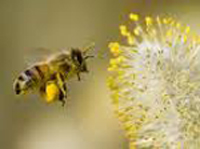
The actual particle is microscopic in size, but as the bee gathers more, it snowballs into a pellet size ball. Bees are typically fuzzy and carry an electrostatic charge which enables grains of pollen to stick to their bodies. Honeybees and bumblebees collect this pollen on their hind legs into a structure called the corbicula or "pollen basket."
Each individual grain is extracted from the flower, joined together with nectar and the bees own digestive enzymes to create an energy-dense food source. This food is collected by the forager bees, packed by other worker bees and then used by the queen bee to feed the young bee larvae or "brood", which nest inside the cells of the honeycomb.
Bee
pollen benefits provide energy, protein and nutrients to meet the nutritional needs of the
hive. When
beekeeper's harvest pollen for human consumption only a certain amount of the pollen is collected, leaving
the rest for the bee population to ensure the health of the colony.
The pollen is brought back to the collection trap, which is like a drawer usually located on the bottom of the beehive. These pollen traps tend to fill up quite fast in the warmer seasons, when more flowers are available and produce less in the winter months.
History of Bee Product Consumption
Ancient peoples have been harvesting honey and pollen from the wild beehive as a
natural food source for close to 15,000 years. It is recorded in ancient
Biblical, Chinese and Egyptian texts as well as
mentioned throughout the ages by many naturalists and early pioneers of Western medicine. Numerous Native American tribes were also known to store pollen in pouches for long excursions.
Human efforts to domesticate wild bees is depicted in Egyptian art about 4,500 years ago. However, a complete understanding of bee colonies did not occur until the 18th century when Europeans first created the moveable beehive.
In addition to pollen, the beehive also produces propolis, raw honey and the infamous royal jelly, reserved exclusively for the queen bee and her eggs. All of these bee products have been consumed extensively throughout human history.
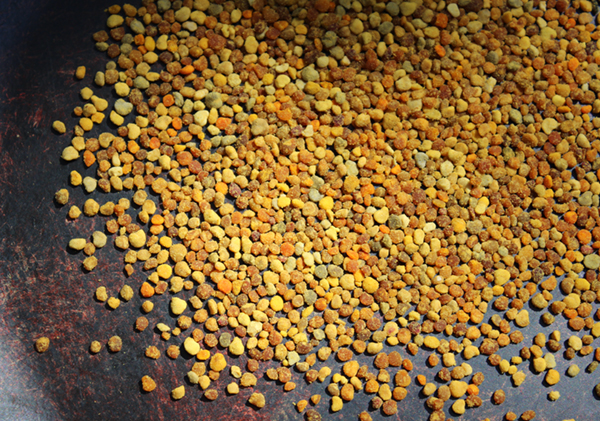
Bee Pollen Benefits
1) High in Protein
2) Folic Acid
3) Rutin and Lecithin
4) Digestive Aid
5) Alkaline Food
6) Reproductive Support
7) Pregnant Women
8) For Allergies
High in Protein and Other Energizing Nutrients
Bee pollen is a protein-rich, energizing food source that is approximately 20-35% protein, depending on the botanical source it was collected from. It is a complete source of all 22 amino acids including the 9 essentials and also contains a plethora of other nutrients, vitamins and minerals like B vitamins, C, E, rutin, beta-carotene, nucleic acids, polysaccharides and lecithin.
Because it is a pre-digested food, it easily moves through the digestive tract and it is quickly absorbed and utilized by the body. This is a unique and specialized feature designed to feed developing bee larvae.
It is also believed to enhance muscle mass in humans as it exhibits natural steroid-like effects as well as contains growth-supporting amino acids and protein. For this reason, bee pollen is used by many bodybuilders and athletes around the world as a dietary supplement that helps to improve strength and increase performance.
Olympic Gold Medalist for Track, Steve Riddick, who had been consuming bee pollen for 5 years as apart of his diet said, "I train better, I run stronger. And it has so many vitamins and amino acids." (*)
B Vitamins and Folic Acid
The minerals found in bee pollen include calcium, iodine, iron, magnesium, barium, gold, copper, manganese, phosphorus, potassium, selenium, silicon, sulfur, sodium and zinc.
Bee pollen benefits are particularly high in B-complex (all of the B
vitamins except for B12), but is especially high in B9 or what is commonly called folic acid.
As many people know, folic acid is an essential vitamin required by
pregnant women, especially in the first trimester.
Interestingly, it is also a required nutrient needed to support the bee colony and nourish the "brood" or eggs of the queen bee.
B vitamins are known energy boosters that help increase metabolism, convert our food into fuel, and are necessary for healthy brain function.
Rutin and Lecithin
Rutin, a glycoside of the flavonoid quercetin, is another nutritive compound found in the pollen. Rutin is a citrus flavonoid also found in citrus fruits and other foods, which may account for its tangy taste.
Rutin helps to protect the blood vessels and supports healthy circulation.
According to researchers at the Institute of Apiculture, Taranov, Russia, "Honeybee pollen is the richest source of vitamins found in Nature in a single food. Even if bee pollen had none of its other vital ingredients, its content of rutin alone would justify taking at least a teaspoon daily, if for no other reason than strengthening the capillaries."
Most high-quality bee pollen is about 15% lecithin. Lecithin is a phospholipid known for its high amount of inositol and choline. Lecithin is a component of cell membranes and makes up about 30% of our brain and important for brain functions.
As a dietary source, it acts as an emulsifier that helps us to break down fats so they can be effectively utilized.
Caution for Those New to Bee Pollen
If you are at all new to bee pollen, it is good to start with small doses, only a few granules at first and build up to larger doses of a tablespoon or more over a week or two, to make sure it works with your particular body type. Ayurvedically speaking, bee pollen is a heating food. Therefore, people who tend to run hot, or are "pitta" body types, should avoid it in high doses as it may cause minor laxative effects, gastrointestinal irritation. It also should be used with caution, or avoided, by those with pollen sensitivity or asthmatic conditions.
Bee Pollen Benefits as a Digestive Aid High in Enzymes
Bee pollen benefits are a potent source of enzymes including: diatase, amylase, phosphatase, pectase, transferase and catalase. These substances are significantly helpful as digestive aids to help break down our food into usable nutrition and energy. This enables us to get more out of the foods we eat, so we don't have to eat as much to feel nutritionally satisfied.
And, as we mentioned, pollen is also a natural source of lecithin which helps to break down fats so we can assimilate them properly.
The addition of just small quantities of bee pollen daily can be especially helpful if your current diet is particularly low in raw fruits and vegetables and high in cooked foods, meat proteins as well as highly processed, canned or packaged foods.
When we eat enzyme-rich foods, we maximize our levels of nutrient absorption and digestion, receiving greater energy from the foods we eat. Disease and degeneration are intimately linked to the damaging effects of a diet low in enzymes. It has been suggested by Dr. Edward Howell, author of "Enzyme Nutrition", that our longevity and quality of life suffer as a result.
An Alkaline Food
Bee pollen benefits the body as an alkaline food source. Many people today suffer from overly acidic diets, caused by stress and poor eating habits.
It is believed by many health authorities that alkaline foods help to neutralize acid levels in the blood, increase body pH and allow for a healthier balance of microflora in the digestive tract, specifically the colon.
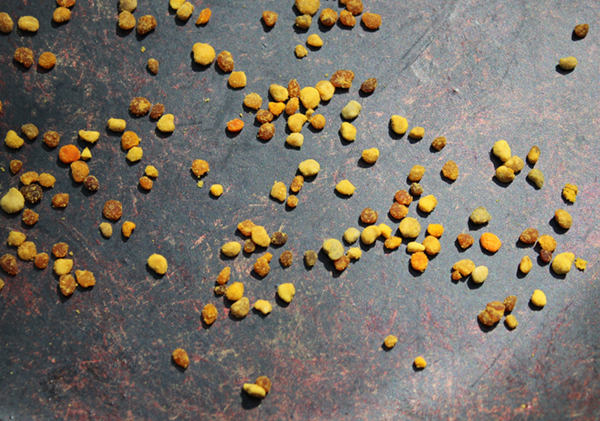
Nutritionally Supports Reproductive Organs
In the words of David Wolfe, "Pollen is the reproductive material of the plant world. It is made up of noble substances (trace mineral elements) that have been drawn up, or levitated into, the seminal point of the plant (flower)."
Bee pollen is a known aphrodisiac and considered a nutritive and nourishing superfood for the sex glands and organs. It has been specifically shown to stimulate the functions of the ovaries and may be a helpful fertility-enhancing food source.
In a 2013 study conducted on rats, results showed "new insights regarding the effect of bee pollen on both secretion activity (release of growth factor IGF-I and steroid hormones progesterone and estradiol) and apoptosis. Bee pollen is shown to be a potent regulator of rat ovarian functions."
In another study examining the effects of bee pollen on reproductive performances of adult buck rabbits, the results showed improved semen quality, weight gain and an increased fertility percentage. (*)
Bee Pollen Benefits for Pregnant Women
In a study conducted by the West China University of Medical Sciences on the influence of bee pollen on pregnant women, "results suggested that bee pollen could improve maternal nutrition without affecting normal fetal development. It is a practical and effective nutrient during pregnancy."
"Bee pollen, as the semen of the plant world, is an incredible food for building ojas." Gabriel Cousens, M.D. "Spiritual Nutrition"
Pregnancy requires "building foods" that nutritionally energize the
growth of new life and small amounts of bee pollen, we feel, can be a very
beneficial dietary nutrient that includes significant amounts of
folic acid, helpful for fetal brain, spinal cord and nervous system development.
As we previously stated, it is a valued nutrient-dense food used by honeybees to support the growth of their own eggs and offspring. Moreover, bee pollen is also believed to be a nourishing food for the queen bee to ripen her ovaries in preparation for developing larvae. Instinctively, the queen also places pollen, a vital protein source, into the egg cells for the larvae to consume as they develop.
"Dr. Nicolai Tsitsin, a Russian botanist found that of those in Russia living past 125 years, many were beekeepers whose main food was bee pollen. Much Russian research has shown that bee pollen has powerful anti-aging and regenerative powers. Bee pollen is the ultimate biogenic food and the procreative force of the plant world." Gabriel Cousens, M.D., author of "Spiritual Nutrition"
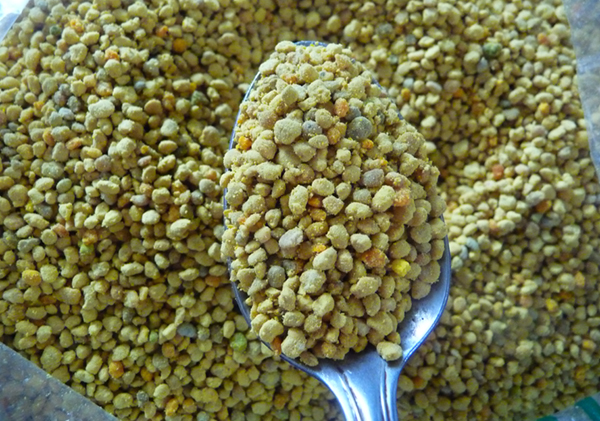
Bee Pollen for Seasonal Allergies
Bee pollen inhibits the release of histamine, which makes it helpful for seasonal allergies and hay fever. One of the key components in the granules responsible for this reaction is the antioxidant rutin.
Some health authorities also believe that bee pollen's ability to relieve allergy symptoms is based on the theory of "desensitization", whereby the pollen granules are thought to contain the allergen and will build up resistance, causing the production of antibodies when exposure occurs. This is also thought to be the case with the superfood known as pine pollen, which can also be beneficial for reducing allergic responses.
Some people, however, can effectively ingest bee pollen and decrease allergic responses to air-borne pollens during pollen season and some people cannot. Sometimes the type of pollen flower source is an important factor in neutralizing many allergies.
It is important to remember to start eating bee pollen several months before pollen season arrives in blended drinks or straight by the spoonful. Local bee pollen sources are always best for treating seasonal allergy symptoms.
Can Cause Severe Allergic Reactions
On rare occasions, some people who are asthmatic and particularly sensitive to a bee's collected pollen can have a strong reaction to consuming it.
Some foods, like peanuts, can also have this effect and cause mild to severe anaphylactic reactions, which in some cases can be deadly. This happens for a relatively small percentage of the population, but it is good to avoid bee pollen as a dietary supplement if you fall into this category.
Some believe that bee pollen allergies occur from bee pollen that is specifically harvested from ragweed's or grasses, which certain individuals are highly allergic to. Others argue that it could also be a sensitivity to poor quality pollen that is not dried or stored correctly and may contain mold or other allergens.
The Benefits of Beekeeping
Small-scale beekeeping is an intimate relationship with bees and their complex community-based management systems. They are great examples of what it means to work as a collective team to achieve a similar goal, the continued survival of their colony.
We personally believe there is great value in the art of holistic beekeeping and there has never been a more crucial time to help encourage flourishing bee populations and the integral role they play in the bio-diversity of our ecosystems as well as our food supply.
Some of you may have heard of the "Colony Collapse Disorder" whereby bee populations around the world seem to be disappearing and reducing in size. There are many theories about what exactly is causing this occurrence, but scientists believe it is a combination of different factors including global warming, pesticide use (like neonicotinoids) as well as habitat loss.
According to the Natural Resources Defense Council, "Beekeepers first sounded the alarm about disappearing bees in the United States in 2006. Seemingly healthy bees were simply abandoning their hives en masse, never to return.
Researchers are calling the mass disappearance Colony Collapse Disorder, and they estimate that nearly one-third of all honey bee colonies in the United States have vanished. The number of hives in the United States is now at its lowest point in the past 50 years." (Source)
As we shift over to a more sustainable organic way of growing food, incorporating permaculture practices and reducing our carbon footprint, backyard beekeeping can be a simple and effective way to make an impact one nurtured beehive at a time.
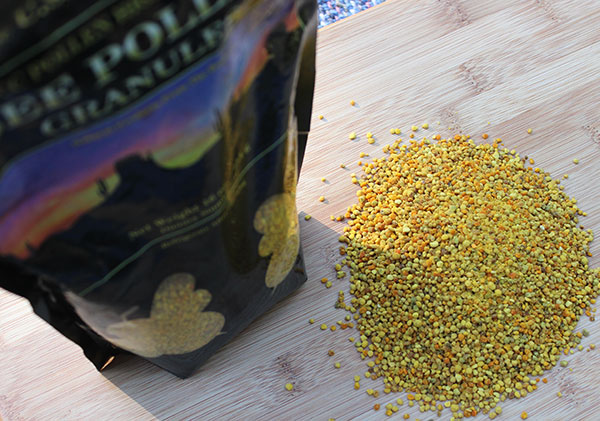
Bee Pollen Quality
It is important to support your local beekeepers or purchase your bee products from reputable companies as opposed to commercial mass-produced bee product corporations who inhumanely treat their beehive colonies or adhere to unsustainable beekeeping practices.
Pollen varies in quality depending on the flowers it is collected from and the cleanliness of the product.
For maximum bee pollen benefits is always best to buy high-quality (organic if available) raw pollen granules in their whole natural state as opposed to powdered or encapsulated.
Bee pollen needs to be dried at the appropriate temperature by the beekeeper, in an air-tight location, to ensure the highest nutritional quality.
For optimum freshness it is good to store your pollen in the refrigerator in a jar or other air-tight container.
How to Use
It has a sweet tangy taste and a soft powdery sort of texture that can be enjoyed all by itself or blended into shakes, smoothies, juices or raw desserts.
It should never be cooked or heated as it will lose nutritional value and enzyme content.
Precautions:
Seek the advice of your health care provider if you have high blood pressure. Avoid bee pollen, or seek medical advice, if you are known to experience anaphylactic reactions, have asthmatic conditions or severe seasonal allergies. Consult your doctor before taking bee pollen if pregnant or breastfeeding and DO NOT give it to infants or young children.
Shop Related Products (About Affiliates & Amazon Associate Paid Links)
Affiliate Disclaimer: This section contains affiliate product links. If you make a purchase through one of our recommended links, we will receive a small commission at no additional cost to you. Thanks for the support!
